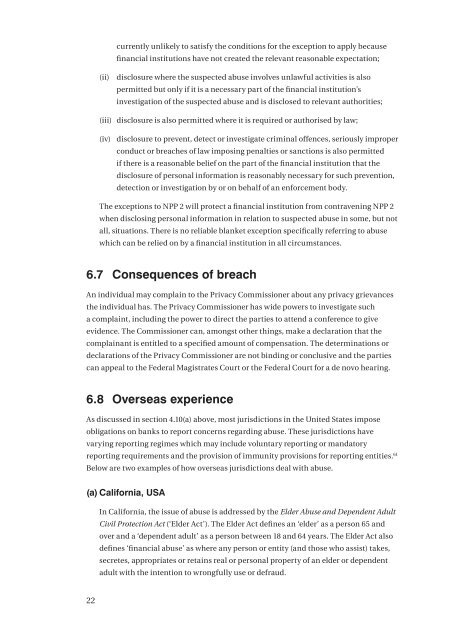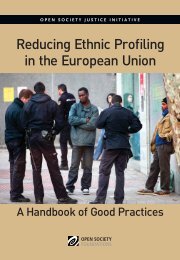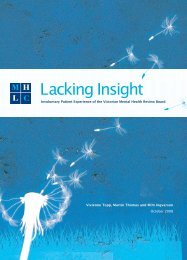Responding to the financial abuse of older people - Loddon ...
Responding to the financial abuse of older people - Loddon ...
Responding to the financial abuse of older people - Loddon ...
- No tags were found...
You also want an ePaper? Increase the reach of your titles
YUMPU automatically turns print PDFs into web optimized ePapers that Google loves.
currently unlikely <strong>to</strong> satisfy <strong>the</strong> conditions for <strong>the</strong> exception <strong>to</strong> apply because<br />
<strong>financial</strong> institutions have not created <strong>the</strong> relevant reasonable expectation;<br />
(ii)<br />
disclosure where <strong>the</strong> suspected <strong>abuse</strong> involves unlawful activities is also<br />
permitted but only if it is a necessary part <strong>of</strong> <strong>the</strong> <strong>financial</strong> institution’s<br />
investigation <strong>of</strong> <strong>the</strong> suspected <strong>abuse</strong> and is disclosed <strong>to</strong> relevant authorities;<br />
(iii) disclosure is also permitted where it is required or authorised by law;<br />
(iv) disclosure <strong>to</strong> prevent, detect or investigate criminal <strong>of</strong>fences, seriously improper<br />
conduct or breaches <strong>of</strong> law imposing penalties or sanctions is also permitted<br />
if <strong>the</strong>re is a reasonable belief on <strong>the</strong> part <strong>of</strong> <strong>the</strong> <strong>financial</strong> institution that <strong>the</strong><br />
disclosure <strong>of</strong> personal information is reasonably necessary for such prevention,<br />
detection or investigation by or on behalf <strong>of</strong> an enforcement body.<br />
The exceptions <strong>to</strong> NPP 2 will protect a <strong>financial</strong> institution from contravening NPP 2<br />
when disclosing personal information in relation <strong>to</strong> suspected <strong>abuse</strong> in some, but not<br />
all, situations. There is no reliable blanket exception specifically referring <strong>to</strong> <strong>abuse</strong><br />
which can be relied on by a <strong>financial</strong> institution in all circumstances.<br />
6.7 Consequences <strong>of</strong> breach<br />
An individual may complain <strong>to</strong> <strong>the</strong> Privacy Commissioner about any privacy grievances<br />
<strong>the</strong> individual has. The Privacy Commissioner has wide powers <strong>to</strong> investigate such<br />
a complaint, including <strong>the</strong> power <strong>to</strong> direct <strong>the</strong> parties <strong>to</strong> attend a conference <strong>to</strong> give<br />
evidence. The Commissioner can, amongst o<strong>the</strong>r things, make a declaration that <strong>the</strong><br />
complainant is entitled <strong>to</strong> a specified amount <strong>of</strong> compensation. The determinations or<br />
declarations <strong>of</strong> <strong>the</strong> Privacy Commissioner are not binding or conclusive and <strong>the</strong> parties<br />
can appeal <strong>to</strong> <strong>the</strong> Federal Magistrates Court or <strong>the</strong> Federal Court for a de novo hearing.<br />
6.8 Overseas experience<br />
As discussed in section 4.10(a) above, most jurisdictions in <strong>the</strong> United States impose<br />
obligations on banks <strong>to</strong> report concerns regarding <strong>abuse</strong>. These jurisdictions have<br />
varying reporting regimes which may include voluntary reporting or manda<strong>to</strong>ry<br />
reporting requirements and <strong>the</strong> provision <strong>of</strong> immunity provisions for reporting entities. 61<br />
Below are two examples <strong>of</strong> how overseas jurisdictions deal with <strong>abuse</strong>.<br />
(a) California, USA<br />
In California, <strong>the</strong> issue <strong>of</strong> <strong>abuse</strong> is addressed by <strong>the</strong> Elder Abuse and Dependent Adult<br />
Civil Protection Act (‘Elder Act’). The Elder Act defines an ‘elder’ as a person 65 and<br />
over and a ‘dependent adult’ as a person between 18 and 64 years. The Elder Act also<br />
defines ‘<strong>financial</strong> <strong>abuse</strong>’ as where any person or entity (and those who assist) takes,<br />
secretes, appropriates or retains real or personal property <strong>of</strong> an elder or dependent<br />
adult with <strong>the</strong> intention <strong>to</strong> wrongfully use or defraud.<br />
22
















